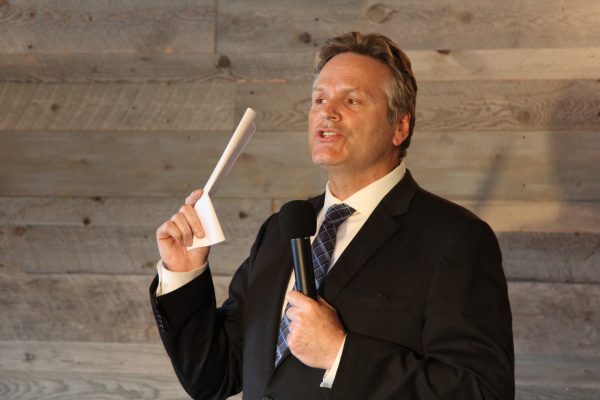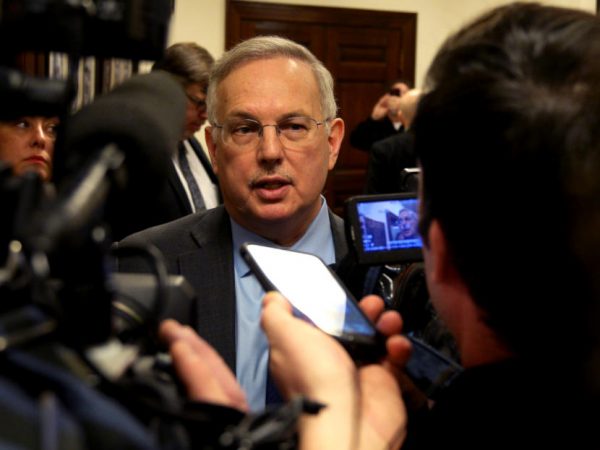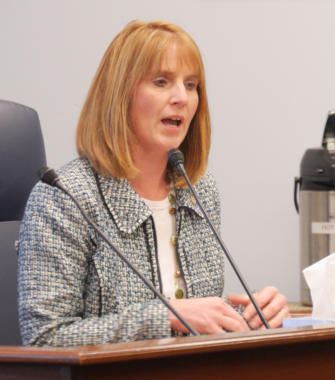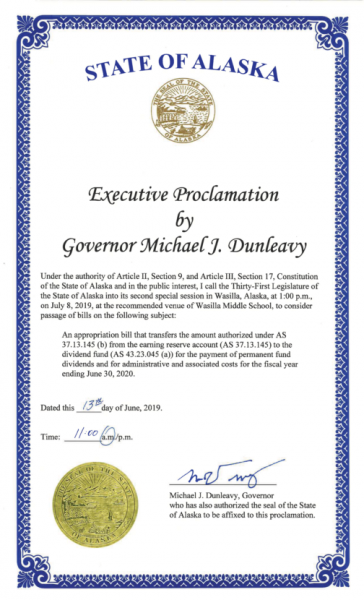
Gov. Mike Dunleavy has called the Alaska Legislature into a second special session to fund permanent fund dividends. The session will begin on July 8 in Wasilla.
He issued the executive proclamation shortly after both chambers of the Legislature adjourned the first special session.
The session would meet on Monday, July 8 at 1 p.m. Dunleavy recommended Wasilla Middle School as the venue. The agenda is limited to paying for PFDs.
While the Legislature passed a capital budget bill, most capital projects didn’t receive funding in the legislation. That’s because lawmakers couldn’t agree on how to fund these projects. The mostly-Democratic House majority caucus wanted to prevent the elimination of funds to equalize the cost of power across the state to pay college scholarships and grants. But the Republican House minority would only agree to do that if full dividends of roughly $3,000 were paid this year. An amendment to fund dividends at that amount failed on Wednesday.
It’s not clear when the Legislature will address the capital budget, which is not included in Dunleavy’s new special session call.
It’s also not clear if there will be a state government shutdown on July 1. Dunleavy’s office has said that the governor could veto the entire operating budget. If he does, the Legislature currently isn’t scheduled to be in session until July 8.
Gov. Mike Dunleavy has called the Alaska Legislature into a second special session to fund permanent fund dividends. The session will begin on July 8 in Wasilla.
He issued the executive proclamation shortly after both chambers of the Legislature adjourned the first special session on Thursday.
Dunleavy said in a statement, “At this point, a change in venue is necessary to refocus the conversation and remind lawmakers about the people and their PFD. Once the issue of the PFD is solved, these other budgetary issues will fall into place quickly.”

House Speaker Bryce Edgmon, a Dillingham independent, said legislators are reviewing their options regarding the location of the special session.
Edgmon also noted that the Legislature must pass the capital budget by the end of July in order to receive federal matching funds. The capital budget is not on the special session call.
“It’s very surprising that the capital budget is not on the call, and I guess I don’t understand it,” Edgmon said.
More than $1 billion in federal funding depends on the state spending some of its own money. While the Senate passed the capital budget bill on Thursday, most capital projects didn’t receive funding in the bill. That’s because lawmakers couldn’t agree on how to fund the projects.
The mostly-Democratic House majority caucus proposed funding the capital budget by drawing from the Constitutional Budget Reserve. That’s a state savings account that three-quarters of both the House and Senate must vote to spend money from. If this vote had been successful, it also would have prevented the elimination of funds to equalize the cost of power across the state, and to pay college scholarships and grants.
But the Republican House minority would only agree to the vote if full dividends of roughly $3,000 were paid this year. An amendment to fund dividends at that amount failed on Wednesday.
Anchorage Republican Sen. Natasha von Imhof said the savings draw is needed.

“We risk missing out on highway matching funds, as well as it’s possible thousands of families could lose good-paying jobs in construction,” she said. “The economy is connected to the government, whether we like it or not.”
More than 30 funds could lose roughly $1.6 billion. The money would be shifted into the Constitutional Budget Reserve.
While the Legislature still has work to do, it appears to have averted a state government shutdown on July 1 when it passed the operating budget on Sunday.
Dunleavy said in a statement on Thursday that the Legislature has avoided a “no budget scenario.”
And Dunleavy press secretary Matt Shuckerow said: “It’s safe to say that the governor does not plan to veto the entire operating budget.”

Andrew Kitchenman is the state government and politics reporter for Alaska Public Media and KTOO in Juneau. Reach him at akitchenman@alaskapublic.org.




